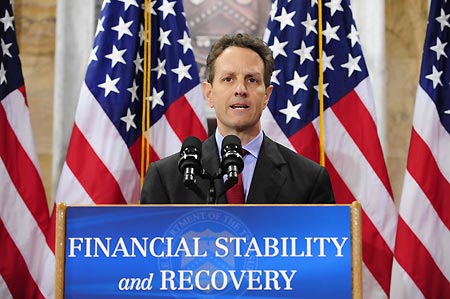U.S. Senate Tuesday approved President Barack Obama's massive stimulus package, which was designed to revive the sagging American economy.
 |
|
U.S. Treasury Secretary Timothy Geithner speaks at a press conference in Washington, the United States, on Feb. 10, 2009. The Obama administration Tuesday unveiled a new financial bailout package to restore the U.S. ailing financial system. [Xinhua Photo] |
The vote was 61-37. Lawmakers had to resolve differences between the Senate 838-billion-dollar bill and an 819-billion- version of the legislation approved last week by the House.
Once a final bill is crafted and passed by both chambers, the measure would be sent to Obama to sign into law. Obama has set a February 16 deadline for the bill.
Obama, who was addressing a gathering in Fort Myers, Florida, a city suffering a lot from the economic crisis, hailed the passage immediately.
"That is good, that is good news," Obama told the people. "It is a good start."
The new president stepped up his pressure on Congress to approve his massive stimulus package in past days, warning that the dire state of the American economy led him to believe "we need to put this recovery plan in motion as soon as possible."
"The situation we face could not be more serious. We have inherited an economic crisis as deep and as dire as any since the Great Depression," said Obama at Tuesday's gathering.
"We find ourselves in a rare moment where the citizens of our country and all countries are watching and waiting for us to lead, " he also warned Monday night at his first prime-time news conference since taking office.
 |
|
U.S. Treasury Secretary Timothy Geithner leaves the platform after speaking at a press conference in Washington, the United States, on Feb. 10, 2009. The Obama administration Tuesday unveiled a new financial bailout package to restore the U.S. ailing financial system. [Xinhua Photo] |
Obama stressed it is only government that can "break the vicious cycle," where lost jobs lead to people spending less money, which leads to even more layoffs.
The Labor Department reported last week that the unemployment rate rose to 7.6 percent in January, the highest level since 1992, as employers slashed 598,000 jobs.
The U.S. economy has lost a staggering 3.6 million jobs since December 2007, when the recession began. And about one-half of this decline occurred in the past 3 months.
"And breaking that cycle is exactly what the plan that's moving through Congress is designed to do," Obama said.
The president hopes the expansive stimulus plan will create or save 3 million to 4 million jobs and help revive the economy, which has been in a recession since December 2007.
The Obama administration was waging an aggressive two-front battle against America's worst economic crisis since the Great Depression in the 1930s.
Earlier Tuesday, Treasury Secretary Timothy Geithner unveiled a new financial bailout package that could top 1.5 trillion dollars to restore the ailing financial system.
"Instead of catalyzing recovery, the financial system is working against recovery. At the same time, the recession is putting greater pressure on banks. This is a dangerous dynamic, and we need to arrest it," warned the Treasury chief.
(Xinhua News Agency February 11, 2009)